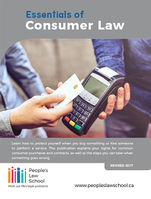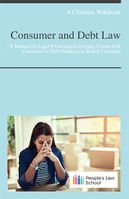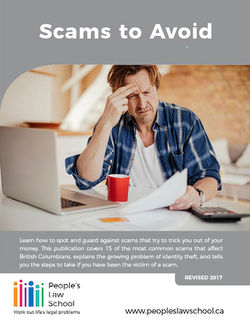Difference between revisions of "Scams to Avoid"
Drew Jackson (talk | contribs) |
|||
| Line 6: | Line 6: | ||
== Contents == | == Contents == | ||
<div class="ul-chapters-books"> | |||
*'''[[Introduction to Scams to Avoid|Introduction]]''' | *'''[[Introduction to Scams to Avoid|Introduction]]''' | ||
| Line 34: | Line 35: | ||
*'''Resources''' | *'''Resources''' | ||
**[[Where to Get Help for Scams to Avoid|Where to Get Help]]{{·}} [[Glossary for Scams to Avoid|Glossary]] | **[[Where to Get Help for Scams to Avoid|Where to Get Help]]{{·}} [[Glossary for Scams to Avoid|Glossary]] | ||
</div> | |||
== About== | == About== | ||
Revision as of 22:42, 1 February 2021
|
|
This is a Clicklaw Wikibook, a collaborative, plain language legal publication that is updated as a wiki and can be printed or downloaded. |
|
|
Download the full Wikibook in PDF. |
|
|
Download the full Wikibook in EPUB (learn more). |
|
|
Buy this Wikibook and get it by mail. |
|
|
Customize: take what you need, leave the rest (learn more). |
Scams to Avoid from People's Law School helps you learn how to spot and guard against scams that try to trick you out of your money. It covers 15 of the most common scams that affect British Columbians, explains the growing problem of identity theft, and tells you the steps to take if you have been the victim of a scam.
Contents
- If You've Been Scammed
- Step 1. Stop communication · Step 2. Gather information · Step 3. Notify financial institutions · Step 4. Cancel missing identification · Step 5. Contact Canada Post · Step 6. Protect your devices · Step 7. Notify police · Step 8. Contact credit reporting agencies · Step 9. Notify consumer agencies · Step 10. Consider legal action · Get help
- Resources
About
Copyright
![]() Scams to Avoid © People’s Law School is, except for the images, licensed under a Creative Commons Attribution-NonCommercial-ShareAlike 2.5 Canada Licence.
Scams to Avoid © People’s Law School is, except for the images, licensed under a Creative Commons Attribution-NonCommercial-ShareAlike 2.5 Canada Licence.
Disclaimer
At People's Law School, we believe accurate, plain English information can help people take action to work out their legal problems. This resource explains in a general way the law that applies in British Columbia. It is not intended as legal advice. For help with a specific legal problem, contact a legal professional. Some sources of legal help are highlighted in the "Where to Get Help" section.
About People's Law School

People's Law School is a non-profit society in British Columbia providing free education and information on the legal problems of daily life. See more titles from People's Law School.
Related titles
Other titles from People's Law School on consumer law:
 Consumer Law Essentials
A primer for the public |
 Consumer and Debt Law
An in-depth manual for advocates |
